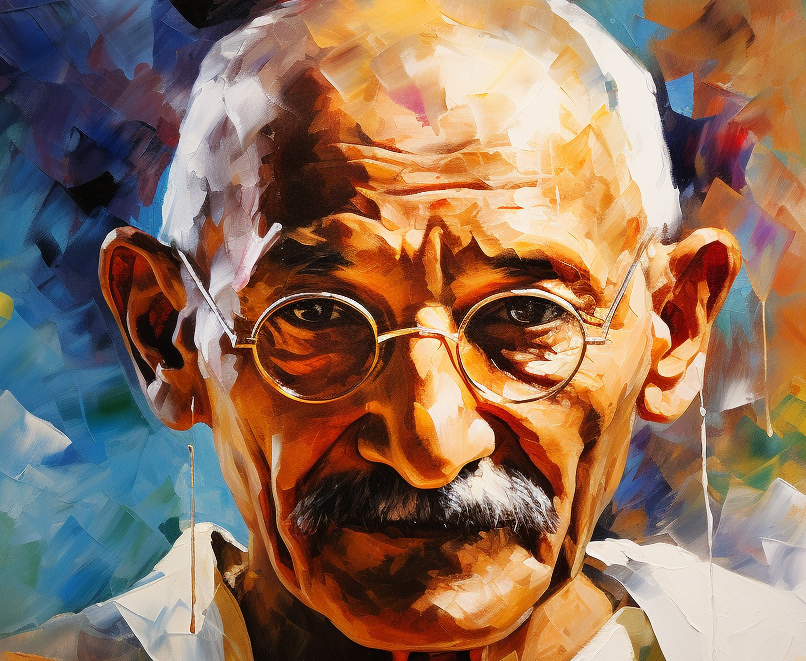Gandhi's Legacy Under Siege: Upholding His Message of Peace
On the 75th anniversary of Mahatma Gandhi's assassination, it is vital to recognize how his legacy is increasingly under siege in India, particularly in the context of the current political landscape. Gandhi, a figure synonymous with non-violence, truth, and communal harmony, finds his teachings in sharp contrast with the ideologies of right-wing factions in India.
The rise of right-wing politics in India, marked by a strong religiously nationalist sentiment, often challenges the core principles that Gandhi stood for. One of the most significant points of contention is the treatment of caste and religious minorities. Gandhi's vision for India was an inclusive one, where all communities, irrespective of their religious or caste identities, coexisted peacefully. However, there have been numerous instances where right-wing groups have been promoting and perpetuating violence against these communities, contradicting Gandhi's teachings.
The political narrative employed by right-wing factions in India sometimes attempts to reinterpret or diminish Gandhi's contributions to India's freedom struggle and his vision for the nation. The glorification of figures like Nathuram Godse, Gandhi's assassin, by fringe elements is indicative of an ideological attack on Gandhi's legacy. This narrative not only undermines Gandhi's immense contributions but also attempts to justify a vision for India that is at odds with his ideals of non-violence and inclusivity.
In contemporary times, the BJP's approach to Gandhi's legacy is paradoxical. While they publicly celebrate his legacy, critics argue that the party's policies and rhetoric often contradict Gandhi's principles. Gandhi's teachings are strategically being hollowed out, with his image used more as a symbol for various government programs rather than embracing his ideas in their entirety. This includes Gandhi's deep belief in "ahimsa" (non-violence and compassion) and his vision of inter-communal friendship and democracy.
Gandhi's commitment to non-violence and his championing of the rights of the oppressed are more relevant than ever in the face of the communal and caste-based violence seen in various parts of India. On this anniversary, reflecting on Gandhi's legacy involves not only remembering his teachings but also critically examining how his vision aligns with the current socio-political context in India. It's a call to reaffirm our commitment to the values of tolerance, peace, and justice that Gandhi stood for, and to resist any attempts to distort or undermine these ideals in the pursuit of divisive political agendas.
The best contemporary critiques of Gandhi's actions and political theories, approach them with a nuanced understanding rather than outright dismissal or distortion. Gandhi's strategies of non-violence and civil disobedience, while revolutionary and effective in the struggle for Indian independence, are sometimes critiqued in the modern context for their applicability in confronting more complex socio-political challenges. Critics argue that Gandhi's approach, centered around the moral high ground of non-violence, might not fully address or resonate with the more immediate and aggressive demands for justice and change seen in today's social movements.
Moreover, Gandhi's ideas on economic self-sufficiency and his vision for an agrarian India are often debated in the face of rapid industrialization and globalization. His emphasis on village economies and simple living is sometimes seen as at odds with contemporary development models. However, these critiques do not diminish Gandhi's contributions but rather invite a re-examination of his ideas in the context of present-day challenges.
Gandhi's stance on caste is another area of significant debate. While he was a staunch opponent of untouchability and worked towards the upliftment of the marginalized, his vision of caste reform is sometimes seen as conservative compared to the more radical approaches advocated by other leaders like B.R. Ambedkar.
These critiques are part of an essential dialogue that examines Gandhi's legacy in a contemporary light, recognizing the evolving nature of socio-political and indeed even faith-based struggles. They invite a deeper engagement with Gandhi's principles, encouraging us to adapt and reinterpret his teachings in ways that address the complexities of the current world, while staying true to the core values of peace, justice, and equality that he championed.
On this somber anniversary, it's crucial to not only pay homage to Gandhi but to also actively engage in preserving and promoting his ideals in the face of challenges and cynical reinterpretations that threaten his enduring legacy.
#RememberingGandhi #PeaceAndJustice #GandhiLegacy #UnityInDiversity #HistoricalReflection
Read in more detail:
https://thediplomat.com/2024/01/how-india-betrayed-mahatma-gandhi/
Courts and the Gandhi murder case: What happened on January 30 and who was behind it? | SabrangIndia
76th Anniversary of Gandhiji’s Martyrdom - Muslim Mirror
Remembering Mahatma Gandhi’s quotes on his death anniversary - The CSR Journal


